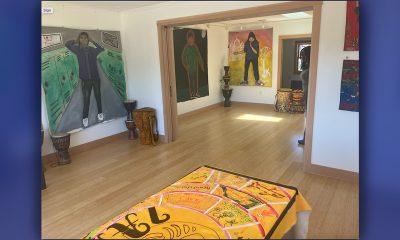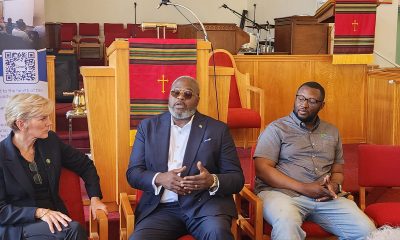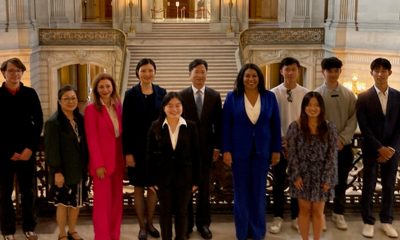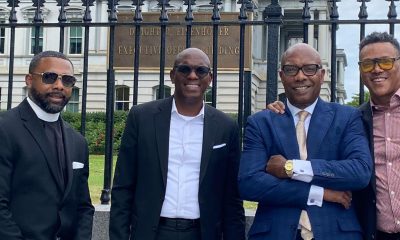Arts and Culture
IN MEMORIAM: Autris Paige
Paige performed regularly at Four Seasons’ Yachats Music Festival in Oregon from 1983-2017, with artists from around the world. Puerto Ricans Ilya and Raphael LeBron, soprano and baritone, remember him: “He leaves us with a warm memory of the simplicity that made him great: as a human being, as a friend and as a masterful artist!” Baritone Anthony Turner of New York says: “Autris was the embodiment of class and elegance. He delivered every song with a warm silken tone and economy of gestures. Autris gave of himself, his truth, his joy and love.” Pianists Dennis Helmrich and Gerald Hecht often collaborated with Mr. Paige said: “Autris Paige was among the most intuitively refined musicians we have encountered: a pure pleasure and a cherished memory.” Pianist Jeongeun Yom, pianist, responds,”Autris will be remembered for his kindness, cheerfulness, and above all for his voice, with which he touched the listeners’ heart.”

August 17, 1938 – January 12, 2023
AUTRIS T. PAIGE was the youngest child born to Estella and Overton Paige in Sugar Land, Texas on Aug. 17, 1938. He passed away on Jan. 12, 2023 in Oakland after a brief illness. He was supported and comforted by his longtime companion Donna Vaughan.
Mr. Paige grew up in Oakland, California where he attended Star Bethel Church and graduated from McClymonds High School. He received a Bachelor of Arts degree from San Francisco State before pursuing advanced studies in musical theatre at the University of Southern California.
He served in the U.S. Air Force.
In 1971, he made his debut with the Los Angeles Civic Light Opera, appearing in Candide at the Los Angeles Music Center and at the Curran Theatre in San Francisco. He appeared with Ray Charles and the American Ballet Theatre and performed in several musical theatre productions on Broadway including Lost in the Stars; Don’t Bother Me, I Can’t Cope; as Walter Lee in Raisin; and in Timbuktu with Eartha Kitt.
Mr. Paige has also sung with the New York City Opera, the Houston Grand Opera, the Metropolitan Opera and with the San Francisco Opera. Other opera companies in which he performed include the Seattle Opera and the Glyndebourne Opera in England. He was featured in the PBS film and award-winning EMI recording of Porgy and Bess as well as the recording of the opera X, The Life and Times of Malcolm X.
When he returned to Oakland to “retire” he met Dr. W. Hazaiah Williams, Founder and Director of Today’s Artists Concerts (now Four Seasons Arts), who auditioned Paige and invited him to perform on his series. Mr. Paige began a new phase of his musical career.
He appeared many times under the auspices of Today’s Artists Concerts/Four Seasons Arts in New York’s Alice Tully Hall and in venues around the Bay Area in their Art of the Spiritual programs. He was featured in his own Spiritual Journey in 2009. His recently released solo CD, Spiritual Journey, based on this program, has received critical acclaim.
Paige performed regularly at Four Seasons’ Yachats Music Festival in Oregon from 1983-2017, with artists from around the world. Puerto Ricans Ilya and Raphael LeBron, soprano and baritone, remember him: “He leaves us with a warm memory of the simplicity that made him great: as a human being, as a friend and as a masterful artist!” Baritone Anthony Turner of New York says: “Autris was the embodiment of class and elegance. He delivered every song with a warm silken tone and economy of gestures. Autris gave of himself, his truth, his joy and love.” Pianists Dennis Helmrich and Gerald Hecht often collaborated with Mr. Paige said: “Autris Paige was among the most intuitively refined musicians we have encountered: a pure pleasure and a cherished memory.” Pianist Jeongeun Yom, pianist, responds,”Autris will be remembered for his kindness, cheerfulness, and above all for his voice, with which he touched the listeners’ heart.”
In 2011, Mr. Paige was featured in Four Seasons Arts’ annual W. Hazaiah Williams Memorial Concert with the Lucy Kinchen Chorale and later with soprano Alison Buchanan. In 2013, he performed his Spiritual Journey II in Berkeley with pianist Othello Jefferson. A second CD entitled Classics and Spirituals was released in September 2013. Pianist Jerry Donaldson of Oakland was a frequent collaborator with Mr. Paige, performing throughout the Bay Area.
A Celebration of Life for Autris Paige will take place Friday, Feb. 3 at 11:00 a.m. at Third Baptist Church of San Francisco, 1399 McAllister Street, San Francisco.
A repast will follow the service.
Art
The Center for ArtEsteem Opens a New Space in West Oakland, Returning Home
After moving into different rental units for the last seven years, The Center for ArtEsteem, a Black-led, West Oakland based non-profit, has bought and renovated a permanent space at 3111 West St. On June 22, about 100 people celebrated the opening of the two-story, 1,500-square-foot space. ArtEsteem Executive Director Amana Harris likened the move to “coming home.”

By Zack Haber
After moving into different rental units for the last seven years, The Center for ArtEsteem, a Black-led, West Oakland based non-profit, has bought and renovated a permanent space at 3111 West St.
On June 22, about 100 people celebrated the opening of the two-story, 1,500-square-foot space.
ArtEsteem Executive Director Amana Harris likened the move to “coming home.”
Founded in 1989, ArtEsteem, which used to be named Attitudinal Healing Connection, opened its first brick-and-mortar space in 1992.
It was located in the bottom unit of a duplex housing the nonprofit’s founders, Aeesha and Kokomon Clottey, who are Harris’s mother and stepfather. That space was located at the corner of 33rd and West Streets.
“We know this community,” said Harris. “We have kids that have grown up in this neighborhood. After moving around, now we see the greater value of returning here and being more accessible to the community.”
Kamilah Crawford, who is an alumna of ArtEsteem and a former employee, told The Oakland Post she’s happy the nonprofit has returned.
“ArtEsteem not only provided me with art classes and employment after graduating from the University of California, Davis, it provided me with a sense of community and social justice,” she said. “Deep down, I believe what I learned played a role in me becoming a physician’s assistant and my desire to give back to my community.”
Since its founding, the nonprofit’s mission has been to “address social ills by providing opportunities for creative expression and healing to children, families, and individuals.”
ArtEsteem has done programming at over 75 schools in West Oakland and the Bay Area. Currently, it serves about 2,500 young people a year in 25 different schools and has a staff of 20 people.
Each year, the non-profit works closely with about 15 to 20 Oakland high school and middle school students through its Oakland Legacy Project. During a 30-week program each school year, ArtEsteem buses these students to its center two days a week after school to feed and educate them about art and environmental awareness and to build self-esteem.
“We don’t just do art for art’s sake,” said Harris. “We use art so young people can have a better understanding of themselves in the world.”
ArtEsteem got a lot of help to secure its new home. The Walter & Elise Haas Fund, the William and Flora Hewlett Foundation, and an anonymous donor from the San Francisco Foundation provided the largest financial donations. About 100 individuals donated $200 or more.
Artists and individuals have also helped to beautify the space and the nearby area. Students from McClymonds High School, Westlake Middle School, and Hoover Elementary School have collaborated with teams of a dozen or more artists to create four murals in the neighborhood through the Oakland Super Heroes Mural Project, which was originated by Harris, directed by David Burke, and funded by the San Francisco Foundation’s Bay Area Creative Core.
A new mural to be designed by former Oakland Legacy Project students, is in the works. The project also recently got help from Ken Houston and Beautification Council with cleaning up a mural that had been covered with graffiti.
In the building itself, one can see art everywhere.
“We want young people and their parents to feel uplifted by the beauty of the space when they come in,” said Harris. “We want to foster healing and resiliency.”
ArtEsteem is not done expanding its space. It is still fundraising and plans to build a new two-story building next door to its current space, set to open in 2027.
“Now that we own our space, we can dig our roots deeper because we won’t be uprooted,” said Harris.
Arts and Culture
Marin City Juneteenth Festival Celebrates Unity in the Community
Marin City celebrated the Eighth Annual Juneteenth Festival on Saturday, June 22, at the Rocky Graham Park. This year’s theme was Umoja, which means Unity in our community. This year, the festival organizers distributed a program flyer that acknowledged and appreciated the 40+ hardworking vendors who brought “art, treasures, service, and culinary delights to our International African Marketplace” and the friends and supporters of the Juneteenth Festival.

By Godfrey Lee
Marin City celebrated the Eighth Annual Juneteenth Festival on Saturday, June 22, at the Rocky Graham Park. This year’s theme was Umoja, which means Unity in our community.
This year, the festival organizers distributed a program flyer that acknowledged and appreciated the 40+ hardworking vendors who brought “art, treasures, service, and culinary delights to our International African Marketplace” and the friends and supporters of the Juneteenth Festival.
The back of the flyer says that the program “only accepts sponsorship from organizations, municipalities and individuals aligned with our values of peace, liberation, justice, and healing of the mind, body and spirit.”
Here are the many vendors listed in the program by category:
- Art, Craft, Clothing
Alecia’s Sweets & Gifts, Atrenia’s Treasures, Magi’s Treasures, Tiffany’s Trendy Treasures, Senegalese Art & Waist Beads Fittings, Superior Boutique, Black Anime Art, Eunice’s Unique Creations, Wise Choices, Belle Noire Accessories, Kimani’s Gifts from Kenya, T-Shirts by Jade, Ms. Cynthia’s Ice Box Magnets, Art/Designed Fashion by Malaak and Ain’s Sweets & T-Shirts, Lumpen Proletariat Digital Gallery, MC Arts Gallery,
- Food, Snacks, Deserts
Nestor’s Jive Turkey Legs, “Dis Nice’ Jamaican Food, “Delightful Foods” Pies/Cookies/Fresh Juices, Akoma Cameroonian Coffee & Gifts, Abhimanyu’s Vegetarian for Life, Clark’s Lemonade, Eats & Treats by Hope Housing, Ms. Clotile’s Fried Fish & Fries, Bryant Family Gumbo, Bakery and Juices, Ms. Eboni’s Sugar Shack, Roadside Soul BBQ, The Red Truck, Lily’s Burgers, Links & Sides, Mr. Leshawn’s Shrimp and Grits,
- Wellness and Activities
Play Marin, FMBC Mental Health Advocates, Prayer Booth with Steve and Alesia, “Spyfro Man,” French Tutoring by Jean Pierre, Orianna’s Books, O’Green Natural Cleaning, Face Painting by Ayanna, Marin City Wellness Clinic/First Aid Booth, Marin Health Team’s Smoothie Bike, Performance Art by Olubori, Deep Healing Massage by Gio, and Horse Rides with Jaymo.
- Community Advocates
Marin City CSD, DWP Flood Project Marin City, Marin City Climate Justice, Center for Domestic Peace, Friends of Golden Gate Village, Marin City Library, Marin City Climate Justice, County of Marin, the Marin Community Foundation, the City of Sausalito, the Marin City Community Services District, MC Art and Culture, Showing Up for Racial Justice, and MCE – Empowering Our Clean Energy Future.
The good Business Neighbors were the Good Earth Natural Foods in Mill Valley, the Marin City Community Development Corporation (MCCDC), Marin City Cornerstone Church, and the First Missionary Baptist Church.
And finally, the program acknowledged the generous friends of the festival: Ricardo Moncrief, Doreen Gounard, Malachia Hoover, Darryl Bozeman, Federico Cortez (owner of “Paws Palace” at the Gateway Mall), Maria Banas, Joan Smith, Kalicia Pivirotto, Jessica Lundy, and the SURJ Marin Volunteers.
Arts and Culture
West Oakland Juneteenth Event Cultivated Love for All
Since 2008, Barbara Howard of B-H Brilliant Minds’ has prided herself on holding the last Juneteenth event in Oakland. And since, unlike most other Bay Area cities, Oakland has not hosted a free observation of the holiday celebrating the end of chattel slavery in the U.S., Howard’s is also the only formally organized Juneteenth event in the city.

By Daisha Williams
Since 2008, Barbara Howard of B-H Brilliant Minds’ has prided herself on holding the last Juneteenth event in Oakland.
And since, unlike most other Bay Area cities, Oakland has not hosted a free observation of the holiday celebrating the end of chattel slavery in the U.S., Howard’s is also the only formally organized Juneteenth event in the city.
From the beginning, Howard brought in grass roots entertainment that was by and for the West Oakland community. Subtitled “Reaching for Wholeness, One Love & One Liberation, the festival was held Saturday from 11:30 a.m. to 6 p.m.
Running from 32nd and Market to San Pablo and Brockhurst, there were stages on both sides of the block, as well as more activities in a courtyard and inside the West Oakland Youth Center.
The day started with a libation for the ancestors by Clint Sockwell, and the ring shout, a homage to the ancestors provided by Omnira Institute’s Awon Ohun Omnira (Voices of Freedom.)
Also on stages all day were R&B, rap, gospel performances, live DJs.
The festival was lively and active, with people constantly milling about, chatting with each other, taking part in activities, dancing, and eating. Events like these are what keeps Oakland a place of community.
With so many different activities– there was really something for everyone. Present were the Made-Men Bay Area Motorcycle Club, a martial arts demonstration, and a quilting exhibit.
There were many vendors selling clothes, jewelry, bags, and even hand dipped incense and candles as well as local organizations such as Building Opportunities for Self Sufficiency (BOSS) and Community Ready Corps (CRC).
There were crafts and free posters being made and the Oakland Public Library giving out books, performances, and music on the stages– there was every opportunity to have a fun and fulfilling time without spending a single dollar.
The Oakland Black Cowboy Association was there giving free, guided horse and pony rides to anyone who wanted one. Their 50-year anniversary is this year, and they are hosting a parade and festival in celebration on Oct. 5 at DeFremery Park.
The Black cowboys go to many events like these providing opportunities to ride a horse to children and adults alike who might not have this opportunity otherwise.
Wilbert F. McAlister, who has been president of the organization for 20 years, was there and you could see the joy on his face as he watched people have this wonderful experience.
B-H Brilliant Minds is a local 501(c) (3) nonprofit organization that serves the Oakland community. Founded by Barbara Howard, they put on this Juneteenth every year. At the event Howard talked about why she puts this event on.
She called all the youth to the stage and told them that this event is put on for them, that they are strong, beautiful, and capable, that they are the future of Black excellence. This event is intended to show them how loved and supported they are in this community, in hopes that they will pass that love down to the next generation.
B-H Brilliant Minds does more than just Juneteenth. They lead three programs: economic empowerment, holistic wellness, and one called The Cutting Edge. The Cutting Edge focuses on self-improvement, leadership skills, and other types of personal growth. Each program consists of at least three workshops and registration is available on their website (bhbrilliantminds.org ).
-

 Arts and Culture3 weeks ago
Arts and Culture3 weeks agoRooted in Tradition: The Intricate History of Black Hair Braiding
-

 Bay Area4 weeks ago
Bay Area4 weeks ago“I Will Not Be Bullied,” Says Oakland Mayor Sheng Thao
-

 Bay Area2 weeks ago
Bay Area2 weeks agoPG&E Increases Rates While Bay Area Households Are Struggling to Stay Afloat
-

 Business3 weeks ago
Business3 weeks agoGov Newsom: Raising Fast Food Minimum Wage to $20 Pays Off as Jobs Multiply in Industry
-

 Activism4 weeks ago
Activism4 weeks agoOpponents of Mayor Sheng Thao Are Calling on Her to Resign Following FBI Raid
-

 Community1 week ago
Community1 week agoHundreds Come to Jehovah’s Witnesses’ Assembly Hall for Three-Day Program of ‘Good News’ in Fremont
-

 Bay Area2 weeks ago
Bay Area2 weeks agoJuneteenth Mass Shooting Suspect Charge with Multiple Counts of Felony Assault by Alameda County DA Pamela Price
-

 Activism4 weeks ago
Activism4 weeks agoOakland Coliseum Sale to AASEG: A Model for Community Development and Inclusion





















































